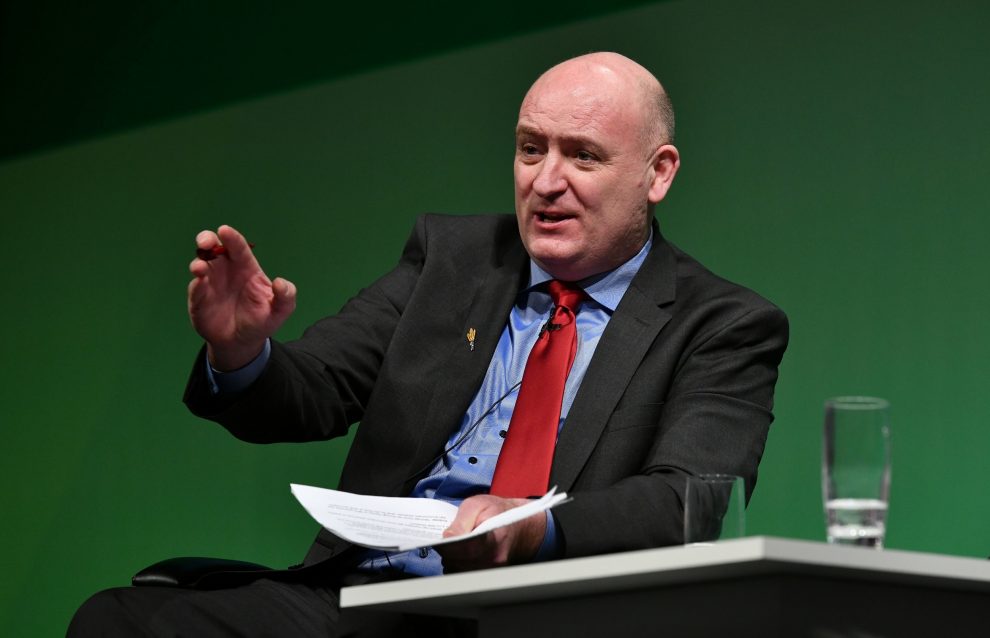LABOUR Senedd Members voted as a bloc to defeat a Plaid Cymru motion to overturn legislation on water pollution.
The motion fell by 30 votes to 27.
While all parties in the Senedd agree that water pollution needs to be curbed, the Welsh Government has specifically targeted Welsh farmers with the blame for it.
That’s despite farmers dramatically reducing the number of water pollution incidents from farms under a voluntary scheme.
NRW confirmed to The Herald that the overwhelming majority of all pollution incidents reported to it are so minor that they require no action.
LABOUR SHUNS
RURAL WALES
With little or no skin in the game in rural Wales, Labour Senedd Members voted to penalise the 80% of Wales’ area in which it lacks representation.
Both of Labour’s Pembrokeshire-based regional members, Joyce Watson and Eluned Morgan, backed the regulations. They have their seats only because Labour performs so dismally in Mid and West Wales’ constituencies.
Aiding and abetting Labour members get their legislation through were outgoing MS for Dwyfor Meirionnydd, Dafydd Elis Thomas and Caroline Jones, formerly of UKIP, who is probably going to lose her regional seat at May’s election. Education Minister Kirsty Williams, the Senedd’s sole Liberal Democrat MS, did not vote at all; not even to abstain.
The Llywydd and Deputy Llywydd, by convention, did not vote in a debate both took turns presiding over.
THE FIGURES
Over the last six years, in spite of Labour’s claims to the contrary, only 54 incidents of agricultural pollution resulted in any formal enforcement action.
Of those 54, NRW confirmed to The Herald, only ONE ended up in court. That was in 2016. Meanwhile, of the same 54, no further action was taken in respect of five allegations of agricultural pollution from a single source.
For the sake of completeness, in 2019 NRW received reports of 7,423 alleged incidents of water pollution. Eleven farmers faced enforcement action out of that number of complaints.
The leading sources of water pollution in Wales are water companies, non-agricultural industry and businesses, and domestic users.
‘THE WRONG ANSWER’
Plaid’s Rural Affairs Shadow Minister, Llŷr Gruffydd MS, said: “The Regulations proposed by the Welsh Government are disproportionate, will have unintended consequences for the environment, and will undermine the viability of many Welsh farms.”

Llyr Huws Gruffydd: Farms’ viability undermined
“It is right that we move to protect our water resources, but under no circumstances should regulations be brought in that increase the risk of harm to our beautiful countryside, and damage an entire sector.
“As I have said before – this is the wrong answer to the right question.”
Welsh Conservative Shadow Rural Affairs Minister, Janet Finch-Saunders said: “Labour’s proposals do not follow the science and their own regulator – Natural Resources Wales – has warned that the proposed new rules will have the perverse outcome of making water quality worse, which is an unacceptable situation in the fight against pollution.
“On numerous occasions during the crisis, Labour promised Welsh farmers that the much-discredited EU regulations would not be introduced during the pandemic and I’m appalled that they have not stuck to their word.
“For the Liberal Democrat member of the Welsh Government to sit on her hands and not even bother to vote tells you all you need to know about what they think of the agricultural community in Wales.
“This is a betrayal of Welsh farming and the environment by Labour and the Lib Dems and a dark day for our rural communities.”
WELSH GOVERNMENT
‘HITS ROCK-BOTTOM’
FUW President Glyn Roberts said: “The decision to cut and paste outdated thirty-year-old EU legislation designed to tackle problems in intensively farmed areas, which has been shown to be ineffective and in many areas make matters worse, is itself a major concern for all those who understand the purpose of Welsh devolution.
“It is, therefore, an additional bitter blow to see a majority of Senedd members voting to support such a lazy, unimaginative and economically and environmentally damaging approach which makes a mockery of devolution and our desire to make Wales a better place.

Glyn Roberts; FUW President
The Welsh Government has hit rock-bottom – not least in terms of misleading the Senedd
by breaking the repeated promise not to bring forward legislation until after the coronavirus pandemic, and making false claims about agricultural pollution getting worse in recent years when incidences have fallen.”
Mr Roberts said that equally cynical had been the Welsh Government’s decision to prevent Senedd members from properly scrutinising the legislation by introducing it via the negative process – meaning it was not considered and amended as part of proper committee stages.
“The decision to deny Senedd members the right to fully scrutinise and improve such draconian Wales-wide legislation and to force it through in the middle of a pandemic reflects a reckless approach to our industry and environment, and it has been sad to witness so many members voting for such approach.
“The repercussions of the legislation are huge, and it will be family farms, tenants and young and new entrants who will suffer the most, and large scale industrial farming which will be most able to absorb the costs.
“The FUW is therefore committed to fighting the regulations in any way possible, and will seek to ensure that the next Welsh Government replaces them with proportionate measures that target pollution without risking bringing the industry to its knees,” said Mr Roberts.
NFU-CYMRU PREPARES
LEGAL CHALLENGE
NFU Cymru President John Davies said: “My thanks go to the Members of the Senedd who stood up for rural Wales today by voting to overturn these regulations and who, like NFU Cymru, believe that there is a better way to safeguard and improve water quality in Wales.
“I am deeply disappointed that Welsh Government, at the height of a global pandemic, has proceeded with a copy and paste into Welsh law of one of the most ineffective and criticised pieces of EU regulation.
“I remain astounded why our government has totally ignored the 45 recommendations based on advice and guidance, voluntary approaches, investment support and smart regulation to improve water quality put forward in 2018 by an expert group chaired and resourced by its own regulator, Natural Resources Wales (NRW).
“I am disheartened that despite NFU Cymru taking forward and delivering a Water Standard that could form the blueprint to a farmer-led approach to nutrient management in Wales – a project designed and delivered in partnership with NRW and the industry, a project that was presented to the Minister in March 2020 for approval – 12 months on we have still not even received a substantive response from the Minister.
“It is clear Welsh Government never had any intention to work in partnership, engage with the evidence or deliver bespoke Welsh made policies to tackle water quality.
“The levels of concern expressed mean that despite the outcome of today’s vote, this is an issue that we must continue to challenge and do our utmost to mitigate its impact on the Welsh food and farming sector.
“It is for this reason that we have instructed our legal team to explore a legal challenge against the Welsh Government’s decision to introduce the regulations.”



















Add Comment